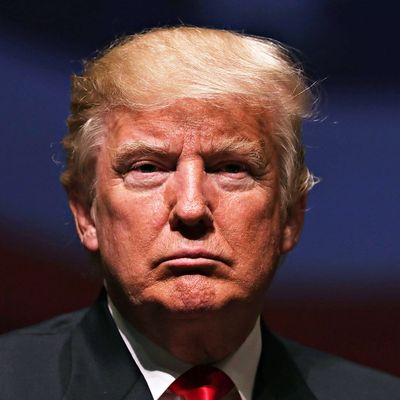
Even before the new Democratic House arrives in Washington, the narrative has already been set: Angry Trump-hating Democrats are going to risk their party’s standing by forcing their leaders to impeach President Trump. The Washington Post has undermined this narrative, examining the public statements of the 52 House Democrats, and finding that only 11 of them have called for impeaching President Trump.
Alas, in the very next sentence after reporting this figure, the Post announces that the media keep repeating the narrative anyway, regardless of whether it has any basis in reality: “Nonetheless, the tension between the freshman class — many of whom rode to power on intense dislike of Trump — and the House Democratic leadership will be a big story line in the new Congress when it convenes in January.”
The hypothetical impeachment of President Trump is a Washington obsession. It of course serves the interests of the Republican Party to conflate any mechanism for oversight or accountability of the administration with the most drastic possible remedy. But impeachment fervor has also been stoked by activists on the left, especially billionaire Tom Steyer, who has spent a fortune promoting it, as well as the news media, which both craves the drama and falls back automatically to the most memorable historical cases of presidents fighting with Congress over scandal (Nixon and Clinton).
While we can’t predict the future with any certainty, we can assume a Nixonian end to the Trump presidency is an extremely remote possibility. The House can impeach by a majority vote, but removing the president from office requires 67 senators, which means at least 20 Republicans. Trump’s influence over the party’s elected officials is growing, and its center of gravity is moving asymptotically toward Trump’s candid observation that he could shoot somebody on Fifth Avenue without losing any support. Democrats largely recognize the near-impossibility of removal and have internalized the pointlessness of impeaching the president to no effect. We can likewise assume with reasonable confidence that, as many lawyers have argued, the president cannot be indicted while in office.
So what’s the point of all the investigation? The point is to establish legal accountability for the president. Well-functioning democracies don’t have criminal oligarchies running the country with legal impunity. The kind of deep systemic corruption Trump is implementing, in which establishing a political alliance with a ruling family is a key step in amassing and protecting wealth, depends on selective legal enforcement. More to the point, it requires business partners. Maybe Donald Trump can’t be hauled off to prison, but his partners can. And that prospect can scare off the collaborators Trump needs.
Second, and more to the point, even if Robert Mueller can’t kick Trump out of the White House directly and the Senate won’t, there’s a body of people who can: the 2020 electorate. And the Trump investigations are building a powerful case that will be brought to bear on that election.
Probably the most important indicator of public opinion with regard to the Mueller probe is a poll from last spring. It found that nearly three-fifths of the public is unaware that Mueller has uncovered any crimes at all. Mueller has already produced indictments or guilty pleas from eight Americans, with more obviously looming.
The breadth of Trump’s legal exposure exceeds that of any president in American history. It is so vast that it is hard to comprehend. Some, and possibly all, of the following appear to have colluded with Russia on behalf of the Trump campaign: Michael Flynn, Roger Stone, Paul Manafort, Donald Trump Jr., and Michael Cohen. Trump has been doing business with the criminal underworld in Russia and elsewhere for years, the secrets of which may be revealed by Mueller, or by House Democrats obtaining his tax returns. Federal prosecutors are investigating whether he violated campaign-finance laws by directing hush money to various mistresses. The state of New York is investigating the Trump Foundation for alleged misappropriation of funds and the Trump Organization for decades-long tax fraud. He is being sued for violating the Constitution’s Emoluments Clause. He is also being sued for fraud.
And this is just the information we know so far, which has come out despite a Congress dedicated to protecting him from investigation, a benefit he will enjoy for only a few more weeks.
It is true that Trump did not put himself before the public as a saint, and had cultivated an image as a somewhat ruthless capitalist. But Trump’s most fundamental promise was to put aside his pursuit of wealth for the public good. His wealth supposedly made him incorruptable. This was a foundation of his ability to pry away economic populist voters from Hillary Clinton, whose image had been tainted by scandals and pseudo-scandals, and to pose as an outsider who would take on big moneyed interests.
The public has not absorbed the reality that Trump has surrounded himself with criminals and continued to use his position for personal profit. Democrats will have the opportunity to undermine his pseudo-populism and portray him as a creature of the swamp, and the parade of convictions and indictments will be a convincing backdrop to this theme.
Most of this information has been filtered through the prism of impeachment, and thus turned into a story about Democrats potentially overreaching or following a quixotic strategy. It should be viewed more realistically as the shaping of a dismal news environment for Trump. The already-unpopular president is looking at two years of perp walks, incriminating testimony and — at best! — a series of suspicious presidential pardons. He barely managed to win the presidency as a brash, controversial novelty. He will have to win it a second time as a known crook.






























